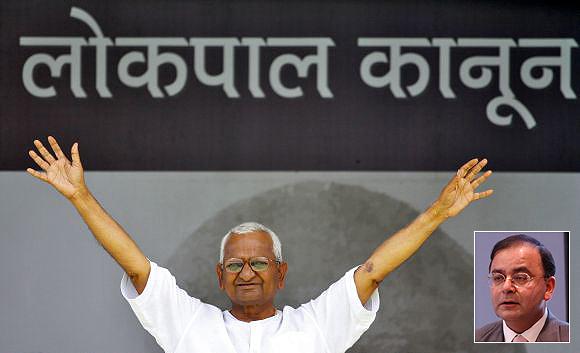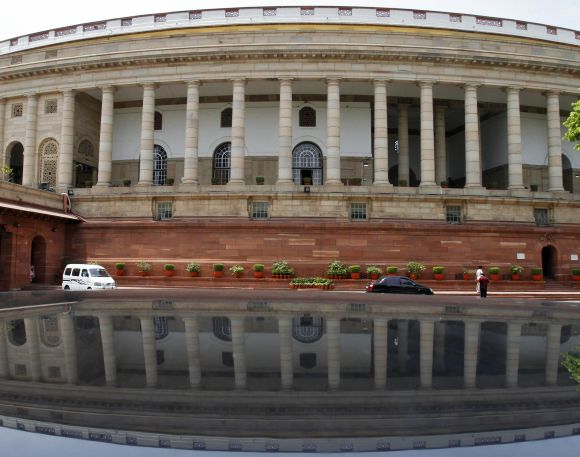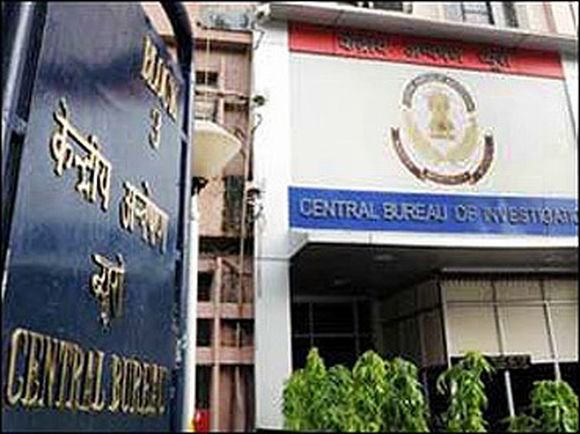
Leader of Opposition in Rajya Sabha Arun Jaitley elaborates on why he thinks the final government draft of the Lokbal Bill is a flawed one.
For over four-and-a-half decades the Lokpal Bill has been a subject matter of public debate. A legitimate impression has gone around that the political class of this country is not interested in seriously pursuing an effective and independent Lokpal.
The debate was recently revived on account of the anti- corruption movement led by Anna Hazare. The final government draft was a flawed one. The appointment of the Lokpal was substantially controlled by the government. The investigative agency at the disposal of the Lokpal was completely government-controlled. The investigation procedure was loaded so as to render any independent investigation nearly impossible.
The debate in the Rajya Sabha on December 29, 2011 demonstrated that the entire Opposition spoke in one voice against the government's bill. The bill was then referred to a select committee of 15 members presided by a senior Congress member Satyavrat Chaturvedi.
The committee has submitted its report to the Rajya Sabha. On most issues the committee report has been unanimous. As member of the select committee there were at least two issues on which some of us had reservations.
The author is a noted advocate and a former Union minister. The article was first published in his personal website.
Please ...

The government has now proposed certain amendments to the report of the select committee. The minister in-charge of the department of personnel, V Narayansamy, has stated that two recommendations of the select committee have not been accepted by the government.
The report of the select committee is the property of the House. Under the Rules of Procedure for Conduct of Business in the Rajya Sabha, once a report is presented to the House by a select committee, the government has no authority to amend the report.
When the report is taken up for consideration any member can propose amendments to the said bill. Similarly, the government can propose final amendments to the bill as passed by the Lok Sabha accepting several suggestions of the select committee and declining to accept the two important suggestions.
Please ...

As a member of the select committee I had a different view on at least two of the suggestions made by the select committee. Additionally, I disagreed with both the changes and deletions made by the Council of Ministers to the report of the standing committee. I shall briefly outline these four issues.
1. Notice to be given to a public servant by the Lokpal before he embarks upon consideration of the complaint against the public servant.
The select committee had consciously deleted the provisions with regard to the Lokpal granting an opportunity of hearing to a public servant while deciding whether to embark upon an enquiry against the public servant or not.
Such an enquiry, though ostensibly appears to be in compliance of the principles of natural justice, would be destructive of any effective probe against a delinquent public servant.
Let us assume a complaint is received against a public servant that he demanding illegal gratification. A search and raid would be necessary. No prior notice should ever be given to a public servant.
Alternatively, if a complaint of disproportionate assets is received against a public servant any prior notice to him by the Lokpal would enable him to remove the entire evidence of disproportionate assets.
Suddenness and surprise are the essence of an investigation. A public servant is interrogated and investigated in a criminal probe. He cannot be given material collected against him during the investigation or prior to investigation. Any representation by a public servant can be considered by the Lokpal at the stage if granting sanction for prosecution.
The right of the public servant to be heard is only at the stage of trial and not otherwise.
Please ...

2. Change of investigating officer without the approval of Lokpal
The officers of the Central Bureau of Investigation must function without fear or favour. An investigating officer may prove inconvenient for the powers that be. Removing him and replacing him with a pliable officer cannot be the discretion of the government.
If during the investigation an officer investigating a case is sought to be moved out, ostensibly on the ground of administrative exigencies, prior approval of the Lokpal should be necessary. There is no plausible reason why the government has chosen to reject this recommendation of the select committee which would have strengthened the institution of Lokpal.
3. Re-employment of retiring CBI director within the government
Along with some other colleagues I had suggested that an outgoing CBI director should not be offered a job in the government. He should not be eligible for any such employment. The desire of a future favour can influence the CBI director while conducting himself in the CBI.
Unfortunately, this suggestion did not find favour with some other colleagues in the committee. There is a strong rationale for acceptance of this suggestion that a CBI director should not be eligible for re-employment in the government.
This is based on the principle that during his tenure as director he must function without fear or favour. The desire of a future favour can be destructive of his independence.
4. Reservation based on religion
The select committee did not favour our suggestion that reservations should not be based on religion. Only such reservations are permissible which are constitutionally provided for and are permissible.
Any form of reservation which uses the word 'not less than' is capable of being understood to include 100 percent reservation.
Such a reservation shall be constitutionally ultra vires. Any form of reservation which is outside the constitutional scheme is vulnerable. The provision for reservation on basis of religion thus needs to be re-looked.
...